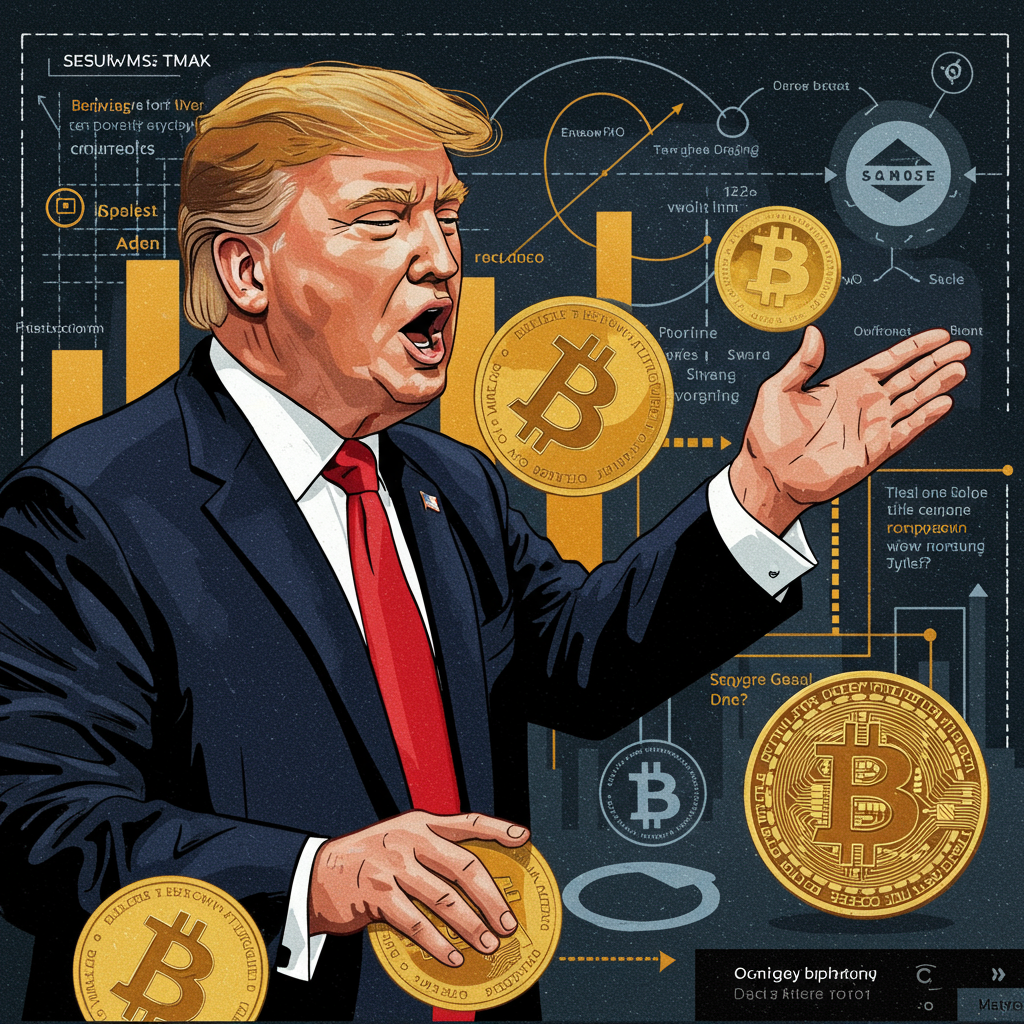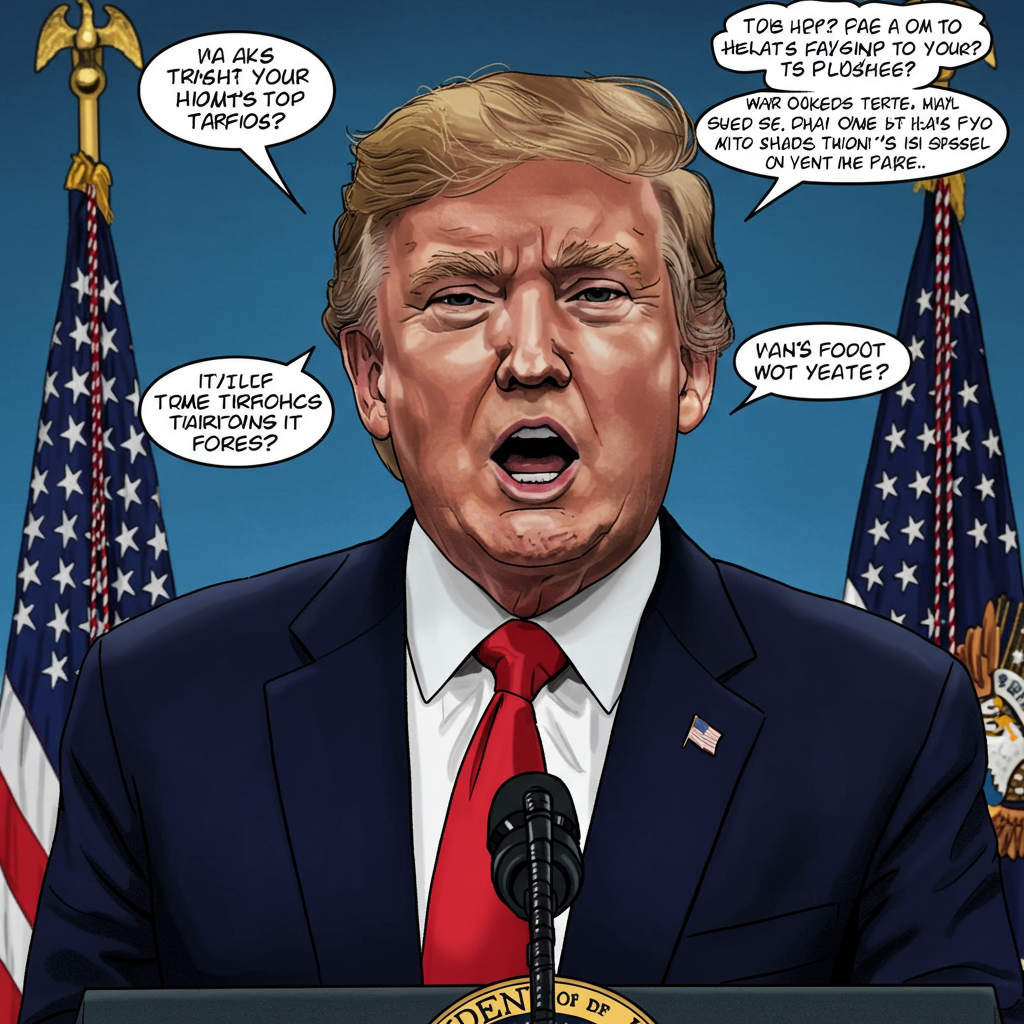Donald Trump’s deep embrace of the volatile cryptocurrency market and his administration’s simultaneous push for rapid deregulation are drawing fierce criticism, with observers labeling his actions as unprecedented conflicts of interest and “open corruption.” This represents a dramatic shift for Trump, who once called Bitcoin a “scam” and warned about unregulated digital assets facilitating unlawful behavior and being based on “thin air.”
Now, the former president and his family are deeply invested in the sector, allegedly profiting immensely from a market they are also actively working to reshape through policy changes. Critics argue this blurs the lines between public duty and personal financial gain in alarming ways.
From Skeptic to Crypto Mogul: Trump’s Personal Ventures
At the heart of the controversy are Trump’s personal crypto ventures. A prime example is the $Trump memecoin, a cryptocurrency token often based on online jokes with no inherent value. Launched before his presidential inauguration, the token has reportedly generated tens of millions for Trump and his partners.
To boost the memecoin’s profile and value, Trump hosted a private dinner and a subsequent White House tour for top buyers in May 2025. Cryptocurrency multibillionaire Justin Sun, who bought $20 million of the token, publicly showcased a $100,000 Trump-branded watch received at one of these events. These events reportedly helped raise around $148 million, much of it from anonymous and foreign sources, further fueling concerns about transparency and influence.
Beyond the memecoin, Trump and his two older sons, Eric and Don Jr., launched World Liberty Financial (WLF), a significant crypto enterprise where they hold a 60% stake. WLF has reportedly raised over $500 million, with the Trump family receiving approximately 75% of crypto token sales. As of early 2025, watchdog groups estimated Trump’s crypto ventures alone could be worth close to $3 billion.
Administration Swiftly Rolls Back Crypto Regulations
Coinciding with Trump’s increasing personal financial stake, his administration has moved rapidly to loosen regulatory oversight of the cryptocurrency industry. Pledging to make the US the “crypto capital,” the administration has taken steps to reverse Biden-era policies and ease rules at key agencies like the Securities and Exchange Commission (SEC) and the Justice Department.
Actions cited include:
The SEC easing regulations and pausing or ending several cases involving crypto fraud.
The Justice Department closing a national cryptocurrency enforcement team established in 2022, despite the team having brought major cases against hackers and criminals. A DOJ memo reportedly linked this policy shift to a pro-crypto Trump executive order.
- The Department of Labor rescinding a Biden-era warning advising “extreme care” for 401K retirement plans investing in crypto, seen by experts as another sign of the administration’s embrace of the industry despite potential risks to ordinary investors.
- www.theguardian.com
- www.inkl.com
- www.theguardian.com
Critics argue these deregulatory moves directly benefit Trump’s own enterprises, his wealthy allies, and campaign donors from the crypto sector, potentially at the expense of investor protection and market integrity.
“Open Corruption” and Unprecedented Conflicts
Ethics watchdogs, former prosecutors, and scholars have voiced shock at the scale and openness of these financial ties intersecting with policy.
Steven Levitsky, a Harvard professor specializing in authoritarian regimes, stated, “I have never seen such open corruption in any modern government anywhere.” Former federal prosecutor Paul Rosenzweig called Trump’s profiting from his memecoin “a textbook example of what the framers [of the Constitution] wanted to avoid.”
Princeton professor Julian Zelizer noted that policy decisions appear driven by Trump’s personal financial interests rather than the nation’s benefit. Richard Briffault, a Columbia law professor and ethics expert, described Trump’s actions as “doubly corrupt,” saying, “Trump is marketing access to himself as a way to profit his memecoin. People are paying to meet Trump and he’s the regulator-in-chief.” Kedric Payne of the Campaign Legal Center called Trump’s financial stakes alongside his regulatory role “unprecedented in modern history.”
This pattern is seen by some as part of a broader strategy where the Trump family and associates leverage public positions and relationships for private financial gain, often involving children managing assets, as seen with Eric and Don Jr.’s roles in WLF.
Controversial Deals and Looming Risks
Specific deals involving WLF have heightened concerns. One lucrative arrangement saw WLF play a central role in a $2 billion investment by an Abu Dhabi fund (MGX) into Binance, the world’s largest crypto exchange. As part of the deal, the Abu Dhabi fund purchased $2 billion of WLF’s stablecoin, USD1, to invest in Binance.
This deal raised eyebrows because Binance had previously pleaded guilty to violating US money-laundering laws and paid a $4 billion fine, and its former CEO served jail time. WLF’s involvement and subsequent events, such as the SEC dismissing a civil lawsuit against Binance after the exchange began listing WLF’s stablecoin, led former Justice Department officials to suggest it signaled “enforcement laxity” that benefits the industry.
Despite the crypto industry being plagued by scandals, fraud, and concerns about lack of transparency, the push for deregulation continues. FBI data shows Americans lost $5.6 billion to crypto fraud in 2023 alone, and reports indicate North Korean hackers stole billions in crypto in recent years, allegedly to finance weapons programs. Critics worry that easing oversight increases risks for ordinary investors and could facilitate illicit activities.
Congressional Pushback
Democrats in Congress have launched inquiries into Trump’s crypto dealings and are pushing for legislation to curb such practices. Senator Jeff Merkley termed Trump’s schemes the “Mount Everest of corruption.” Senator Elizabeth Warren stated plainly, “Donald Trump has turned the presidency into a crypto cash machine.” They advocate for bills that would prevent federal officials, including the President and his family, from profiting from crypto ventures.
Trump Brand’s Broader Crypto Expansion
The Trump brand’s involvement in crypto extends beyond personal ventures. Trump Media & Technology Group (TMTG), parent company of Truth Social, is also making aggressive moves into the digital asset space. TMTG has proposed launching cryptocurrency Exchange-Traded Funds (ETFs) that would invest in Bitcoin and Ethereum, aiming to compete in a crowded market potentially by leveraging brand recognition. TMTG also launched its Truth.Fi platform for crypto trading and payments, funded in part by significant capital raises.
Dismissal of Criticism
Trump and his family have largely dismissed critics, stating events are attended in a “personal capacity” and that business interests are managed via a trust by his children. However, critics argue these measures are insufficient given Trump’s public promotion of his ventures and the direct correlation between his administration’s policy actions and the crypto industry’s — and his own — financial interests.
As the regulatory landscape shifts rapidly, the unprecedented entanglement of a President’s personal wealth with a lightly regulated, volatile industry remains a central point of contention, fueling accusations of a presidency leveraged for personal profit.



